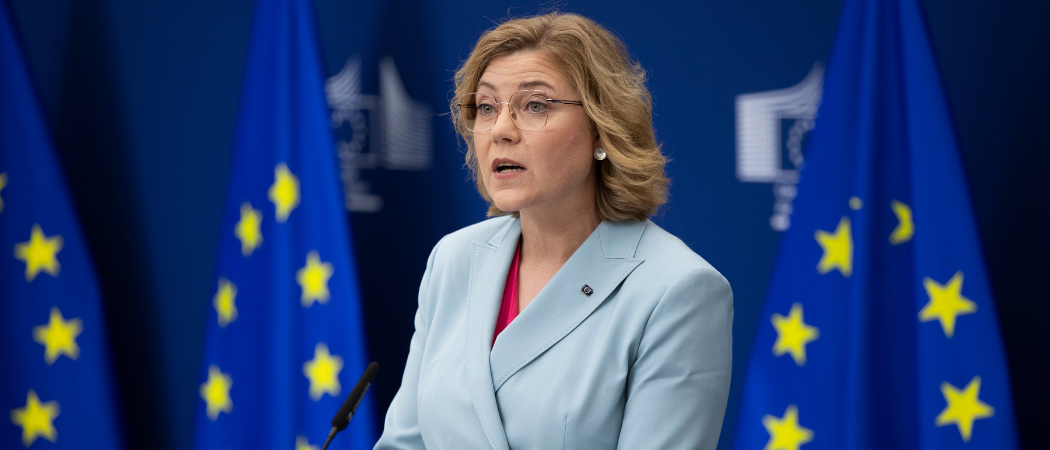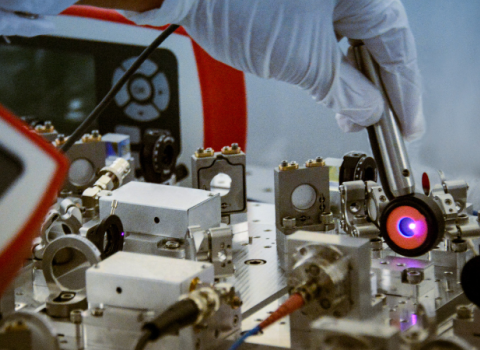The Quantum Europe Research and Innovation Initiative will include support for foundational research, industrialisation and applications

Henna Virkkunen, Executive Vice-President of the European Commission, on the EU’s Quantum Strategy on July 2, 2025. Photo credits: Lukasz Kobus / European Union
The European Commission wants to bring EU states together around a unified vision for quantum research and innovation, in order to transform Europe’s strong position in quantum research into economic leadership.
“Quantum technologies will change our economy, by helping us solve complex challenges, create new medicines, and protect critical infrastructure,” said Henna Virkkunen, the commissioner responsible for technology sovereignty, presenting the quantum strategy on July 2. Defence and security applications are also expected, from secure communications to battlefield sensing.
By harnessing the laws of quantum mechanics, quantum technologies have the potential to solve complex problems beyond the reach of classical computers, produce more precise sensors and provide an additional layer of security for sensitive data. This could well be necessary, since quantum computers will also be able to break many established security systems.
According to the Commission, Europe leads the world in scientific publications on quantum and has a large start-up ecosystem, but it lags behind when it comes to patents and capturing real market opportunities.
Over the past five years, the EU has invested almost €2 billion in quantum technologies, with an additional €9 billion coming from governments. However, the quantum ecosystem in Europe remains “fragile” due to the fragmentation of support across member states and a lack of private capital, Virkkunen said.
Europe attracts only 5% of global private quantum funding, compared to over 50% going to the US. “This makes scaling from research to industry very challenging for our start-ups and for our companies,” she said.
Europe’s tech industry welcomed the initiative, but warned that execution will be crucial. The strategy is “a welcome signal of long-term thinking and ambition,” said Juha Vartiainen, chief global affairs officer at Finland’s IQM Quantum Computers. “By acting with urgency, focusing on scale-up and fostering a truly integrated European quantum ecosystem we can not only keep pace but indeed lead the world in the quantum-powered AI era.”
“Quantum is Europe’s shot at global tech leadership, but only if we move fast,” said Cecilia Bonefeld-Dahl, director general of industry association DigitalEurope. She urged the EU to maintain its focus on incentivising investment, cross-border procurement and attracting talent, rather than trying to regulate the sector before it is mature.
Related articles:
- Viewpoint: How can Europe lead in the quantum computing revolution?
- G7 leaders set out new AI and quantum research agenda
Research and innovation initiative
Central to the strategy is a planned Quantum Europe Research and Innovation Initiative, intended to align EU and national efforts around a commonly agreed research and innovation agenda.
It will encompass support for foundational research, technological development and innovation actions; investment in quantum infrastructure, pilot lines and design tools; and support to develop public and industrial applications.
A new governance framework to implement the initiative will be presented as part of next year’s Quantum Act. In the meantime, the mandate of the European High Performance Computing Joint Undertaking will be expanded to incorporate all quantum technologies.
To address specific technological problems, the Commission plans to launch a series of “quantum grand challenges,” bringing together scientists, industrial users, manufacturers and other actors. These will be “similar in ambition and structure to past mission-oriented initiatives.” It plans to pilot at least two challenges between 2025 and 2027 alongside the European Investment Bank and member states.
Quantum chips will play a key role in enabling quantum technologies to be deployed, and the Chips Joint Undertaking will soon launch its first six quantum pilot lines. Under the new strategy, the Commission wants to launch a quantum design facility which will be connected to the pilot lines. Next year, it will publish a quantum chips industrialisation roadmap to guide the push towards large-scale, low-cost quantum chips manufacturing.
The Commission is also keen to exploit quantum’s dual-use potential. It plans to develop a quantum roadmap alongside the European Space Agency, as well as a quantum sensing space and defence technology roadmap. From 2026, the EU plans to launch spin-in initiatives to accelerate the uptake of civil quantum innovations for security and defence applications.
Skills are also included in the strategy. The Commission is promising to launch a quantum talent mobility programme, while the European Innovation Council will launch a pilot programme this year to place researchers-in-residence with quantum technology start-ups.
The EU has already identified quantum as a critical technology, and the sector will benefit from support under strategic programmes such as the upcoming Scaleup Europe Fund. However, the EU is “very willing” to cooperate with other countries, particularly those with which it has signed a digital partnership, such as Japan and Canada, Virkkunen said. The strategy foresees joint research programmes, coordinated calls and reciprocal access to infrastructures.
A high-level advisory board composed of European quantum scientists and technology experts has been set up to provide guidance on the implementation of the strategy.





 A unique international forum for public research organisations and companies to connect their external engagement with strategic interests around their R&D system.
A unique international forum for public research organisations and companies to connect their external engagement with strategic interests around their R&D system.